A Critical Evaluation of Sustainable Hospitality Management Practices
VerifiedAdded on 2023/02/01
|13
|4047
|78
Report
AI Summary
This report critically evaluates the extent to which the hospitality industry contributes to sustainability issues, focusing on corporate social responsibility, eco-friendly practices, and globalization. It analyzes the impacts of these issues on the profitability of the hospitality industry, considering factors such as brand image, consumer loyalty, and community services. The report also highlights the importance of corporate sustainability management, including green building design, energy consumption tracking, water conservation, and the adoption of eco-friendly practices to attract environmentally conscious guests. Furthermore, it discusses the influence of globalization on the hospitality sector, encompassing cultural diversity and the need for hotels to adapt to various cultures to enhance profitability and consumer satisfaction. The report emphasizes the need for standardization and localization strategies to maintain brand consistency and promote job creation within the industry.

SUSTAINABLE HOSPITALITY
MANAGEMENT
MANAGEMENT
Paraphrase This Document
Need a fresh take? Get an instant paraphrase of this document with our AI Paraphraser

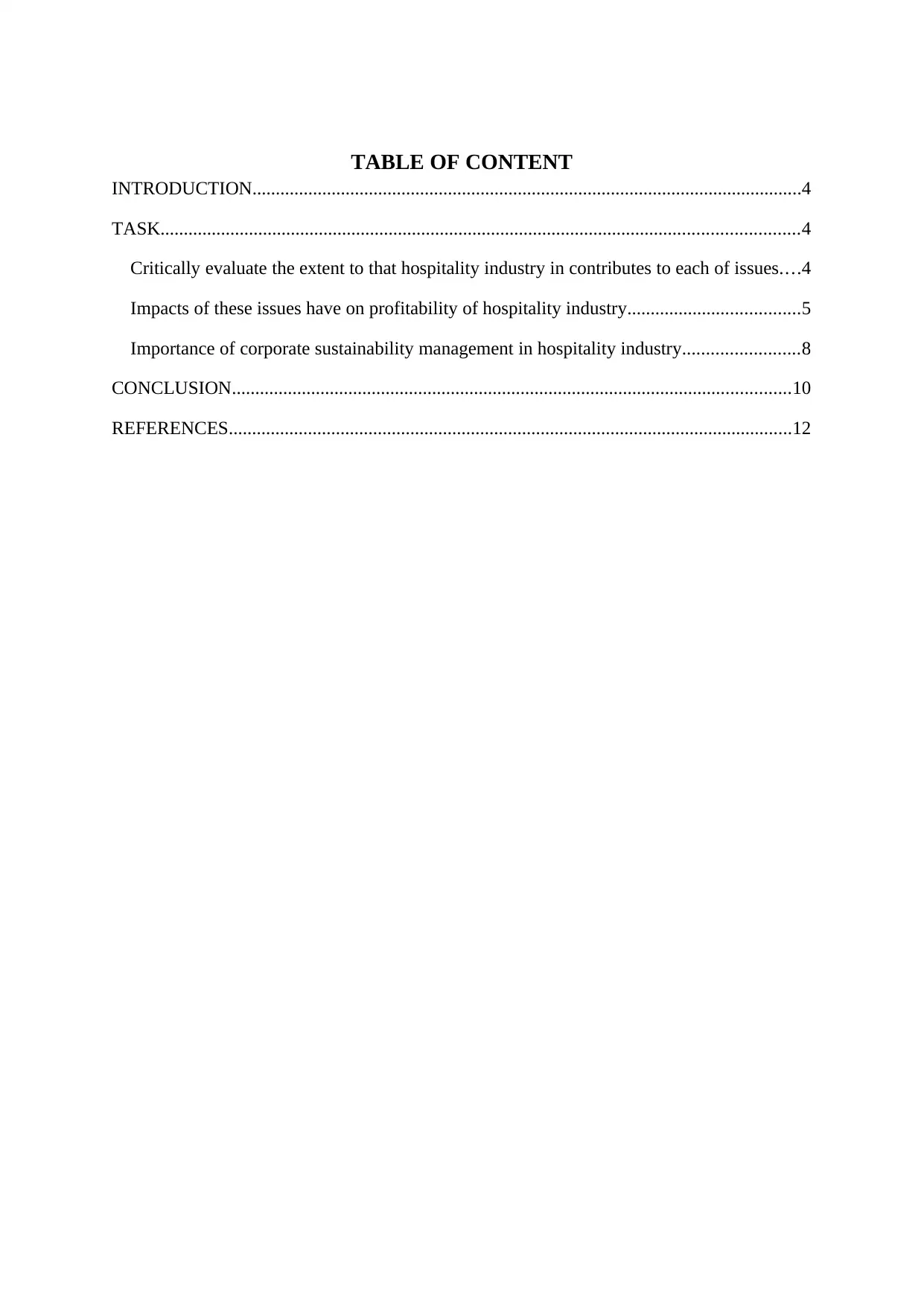
TABLE OF CONTENT
INTRODUCTION......................................................................................................................4
TASK.........................................................................................................................................4
Critically evaluate the extent to that hospitality industry in contributes to each of issues....4
Impacts of these issues have on profitability of hospitality industry.....................................5
Importance of corporate sustainability management in hospitality industry.........................8
CONCLUSION........................................................................................................................10
REFERENCES.........................................................................................................................12
INTRODUCTION......................................................................................................................4
TASK.........................................................................................................................................4
Critically evaluate the extent to that hospitality industry in contributes to each of issues....4
Impacts of these issues have on profitability of hospitality industry.....................................5
Importance of corporate sustainability management in hospitality industry.........................8
CONCLUSION........................................................................................................................10
REFERENCES.........................................................................................................................12
⊘ This is a preview!⊘
Do you want full access?
Subscribe today to unlock all pages.

Trusted by 1+ million students worldwide
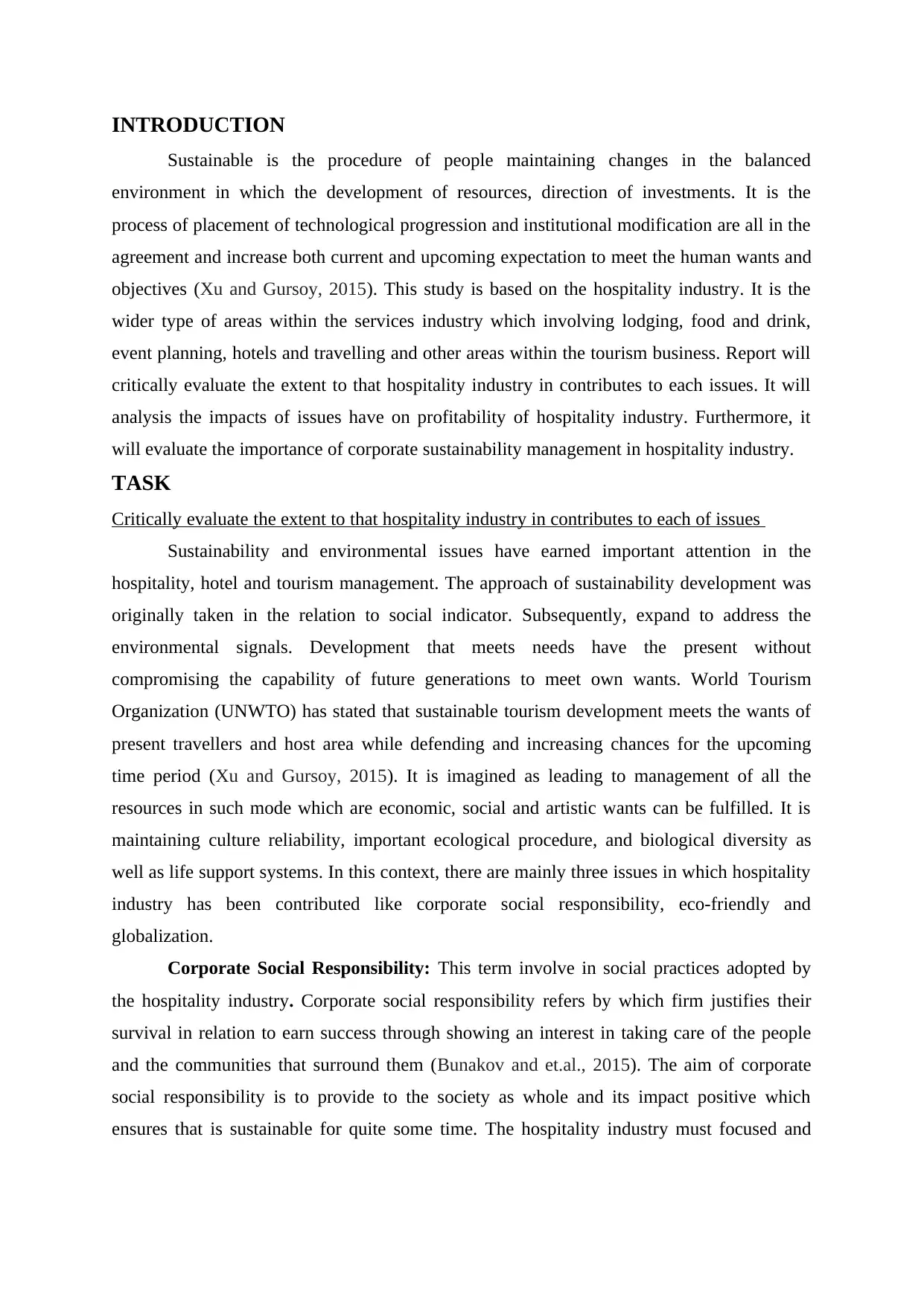
INTRODUCTION
Sustainable is the procedure of people maintaining changes in the balanced
environment in which the development of resources, direction of investments. It is the
process of placement of technological progression and institutional modification are all in the
agreement and increase both current and upcoming expectation to meet the human wants and
objectives (Xu and Gursoy, 2015). This study is based on the hospitality industry. It is the
wider type of areas within the services industry which involving lodging, food and drink,
event planning, hotels and travelling and other areas within the tourism business. Report will
critically evaluate the extent to that hospitality industry in contributes to each issues. It will
analysis the impacts of issues have on profitability of hospitality industry. Furthermore, it
will evaluate the importance of corporate sustainability management in hospitality industry.
TASK
Critically evaluate the extent to that hospitality industry in contributes to each of issues
Sustainability and environmental issues have earned important attention in the
hospitality, hotel and tourism management. The approach of sustainability development was
originally taken in the relation to social indicator. Subsequently, expand to address the
environmental signals. Development that meets needs have the present without
compromising the capability of future generations to meet own wants. World Tourism
Organization (UNWTO) has stated that sustainable tourism development meets the wants of
present travellers and host area while defending and increasing chances for the upcoming
time period (Xu and Gursoy, 2015). It is imagined as leading to management of all the
resources in such mode which are economic, social and artistic wants can be fulfilled. It is
maintaining culture reliability, important ecological procedure, and biological diversity as
well as life support systems. In this context, there are mainly three issues in which hospitality
industry has been contributed like corporate social responsibility, eco-friendly and
globalization.
Corporate Social Responsibility: This term involve in social practices adopted by
the hospitality industry. Corporate social responsibility refers by which firm justifies their
survival in relation to earn success through showing an interest in taking care of the people
and the communities that surround them (Bunakov and et.al., 2015). The aim of corporate
social responsibility is to provide to the society as whole and its impact positive which
ensures that is sustainable for quite some time. The hospitality industry must focused and
Sustainable is the procedure of people maintaining changes in the balanced
environment in which the development of resources, direction of investments. It is the
process of placement of technological progression and institutional modification are all in the
agreement and increase both current and upcoming expectation to meet the human wants and
objectives (Xu and Gursoy, 2015). This study is based on the hospitality industry. It is the
wider type of areas within the services industry which involving lodging, food and drink,
event planning, hotels and travelling and other areas within the tourism business. Report will
critically evaluate the extent to that hospitality industry in contributes to each issues. It will
analysis the impacts of issues have on profitability of hospitality industry. Furthermore, it
will evaluate the importance of corporate sustainability management in hospitality industry.
TASK
Critically evaluate the extent to that hospitality industry in contributes to each of issues
Sustainability and environmental issues have earned important attention in the
hospitality, hotel and tourism management. The approach of sustainability development was
originally taken in the relation to social indicator. Subsequently, expand to address the
environmental signals. Development that meets needs have the present without
compromising the capability of future generations to meet own wants. World Tourism
Organization (UNWTO) has stated that sustainable tourism development meets the wants of
present travellers and host area while defending and increasing chances for the upcoming
time period (Xu and Gursoy, 2015). It is imagined as leading to management of all the
resources in such mode which are economic, social and artistic wants can be fulfilled. It is
maintaining culture reliability, important ecological procedure, and biological diversity as
well as life support systems. In this context, there are mainly three issues in which hospitality
industry has been contributed like corporate social responsibility, eco-friendly and
globalization.
Corporate Social Responsibility: This term involve in social practices adopted by
the hospitality industry. Corporate social responsibility refers by which firm justifies their
survival in relation to earn success through showing an interest in taking care of the people
and the communities that surround them (Bunakov and et.al., 2015). The aim of corporate
social responsibility is to provide to the society as whole and its impact positive which
ensures that is sustainable for quite some time. The hospitality industry must focused and
Paraphrase This Document
Need a fresh take? Get an instant paraphrase of this document with our AI Paraphraser
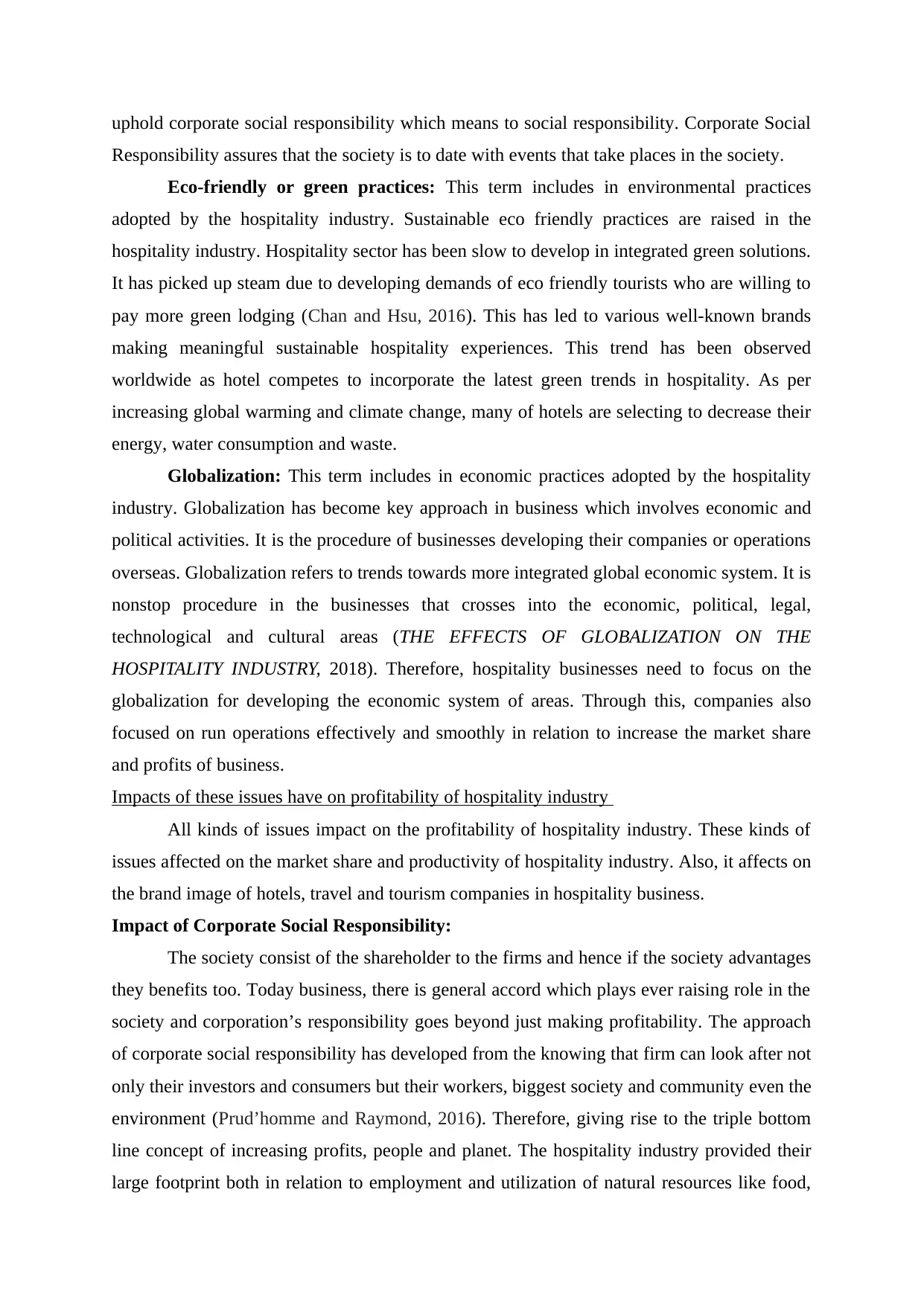
uphold corporate social responsibility which means to social responsibility. Corporate Social
Responsibility assures that the society is to date with events that take places in the society.
Eco-friendly or green practices: This term includes in environmental practices
adopted by the hospitality industry. Sustainable eco friendly practices are raised in the
hospitality industry. Hospitality sector has been slow to develop in integrated green solutions.
It has picked up steam due to developing demands of eco friendly tourists who are willing to
pay more green lodging (Chan and Hsu, 2016). This has led to various well-known brands
making meaningful sustainable hospitality experiences. This trend has been observed
worldwide as hotel competes to incorporate the latest green trends in hospitality. As per
increasing global warming and climate change, many of hotels are selecting to decrease their
energy, water consumption and waste.
Globalization: This term includes in economic practices adopted by the hospitality
industry. Globalization has become key approach in business which involves economic and
political activities. It is the procedure of businesses developing their companies or operations
overseas. Globalization refers to trends towards more integrated global economic system. It is
nonstop procedure in the businesses that crosses into the economic, political, legal,
technological and cultural areas (THE EFFECTS OF GLOBALIZATION ON THE
HOSPITALITY INDUSTRY, 2018). Therefore, hospitality businesses need to focus on the
globalization for developing the economic system of areas. Through this, companies also
focused on run operations effectively and smoothly in relation to increase the market share
and profits of business.
Impacts of these issues have on profitability of hospitality industry
All kinds of issues impact on the profitability of hospitality industry. These kinds of
issues affected on the market share and productivity of hospitality industry. Also, it affects on
the brand image of hotels, travel and tourism companies in hospitality business.
Impact of Corporate Social Responsibility:
The society consist of the shareholder to the firms and hence if the society advantages
they benefits too. Today business, there is general accord which plays ever raising role in the
society and corporation’s responsibility goes beyond just making profitability. The approach
of corporate social responsibility has developed from the knowing that firm can look after not
only their investors and consumers but their workers, biggest society and community even the
environment (Prud’homme and Raymond, 2016). Therefore, giving rise to the triple bottom
line concept of increasing profits, people and planet. The hospitality industry provided their
large footprint both in relation to employment and utilization of natural resources like food,
Responsibility assures that the society is to date with events that take places in the society.
Eco-friendly or green practices: This term includes in environmental practices
adopted by the hospitality industry. Sustainable eco friendly practices are raised in the
hospitality industry. Hospitality sector has been slow to develop in integrated green solutions.
It has picked up steam due to developing demands of eco friendly tourists who are willing to
pay more green lodging (Chan and Hsu, 2016). This has led to various well-known brands
making meaningful sustainable hospitality experiences. This trend has been observed
worldwide as hotel competes to incorporate the latest green trends in hospitality. As per
increasing global warming and climate change, many of hotels are selecting to decrease their
energy, water consumption and waste.
Globalization: This term includes in economic practices adopted by the hospitality
industry. Globalization has become key approach in business which involves economic and
political activities. It is the procedure of businesses developing their companies or operations
overseas. Globalization refers to trends towards more integrated global economic system. It is
nonstop procedure in the businesses that crosses into the economic, political, legal,
technological and cultural areas (THE EFFECTS OF GLOBALIZATION ON THE
HOSPITALITY INDUSTRY, 2018). Therefore, hospitality businesses need to focus on the
globalization for developing the economic system of areas. Through this, companies also
focused on run operations effectively and smoothly in relation to increase the market share
and profits of business.
Impacts of these issues have on profitability of hospitality industry
All kinds of issues impact on the profitability of hospitality industry. These kinds of
issues affected on the market share and productivity of hospitality industry. Also, it affects on
the brand image of hotels, travel and tourism companies in hospitality business.
Impact of Corporate Social Responsibility:
The society consist of the shareholder to the firms and hence if the society advantages
they benefits too. Today business, there is general accord which plays ever raising role in the
society and corporation’s responsibility goes beyond just making profitability. The approach
of corporate social responsibility has developed from the knowing that firm can look after not
only their investors and consumers but their workers, biggest society and community even the
environment (Prud’homme and Raymond, 2016). Therefore, giving rise to the triple bottom
line concept of increasing profits, people and planet. The hospitality industry provided their
large footprint both in relation to employment and utilization of natural resources like food,
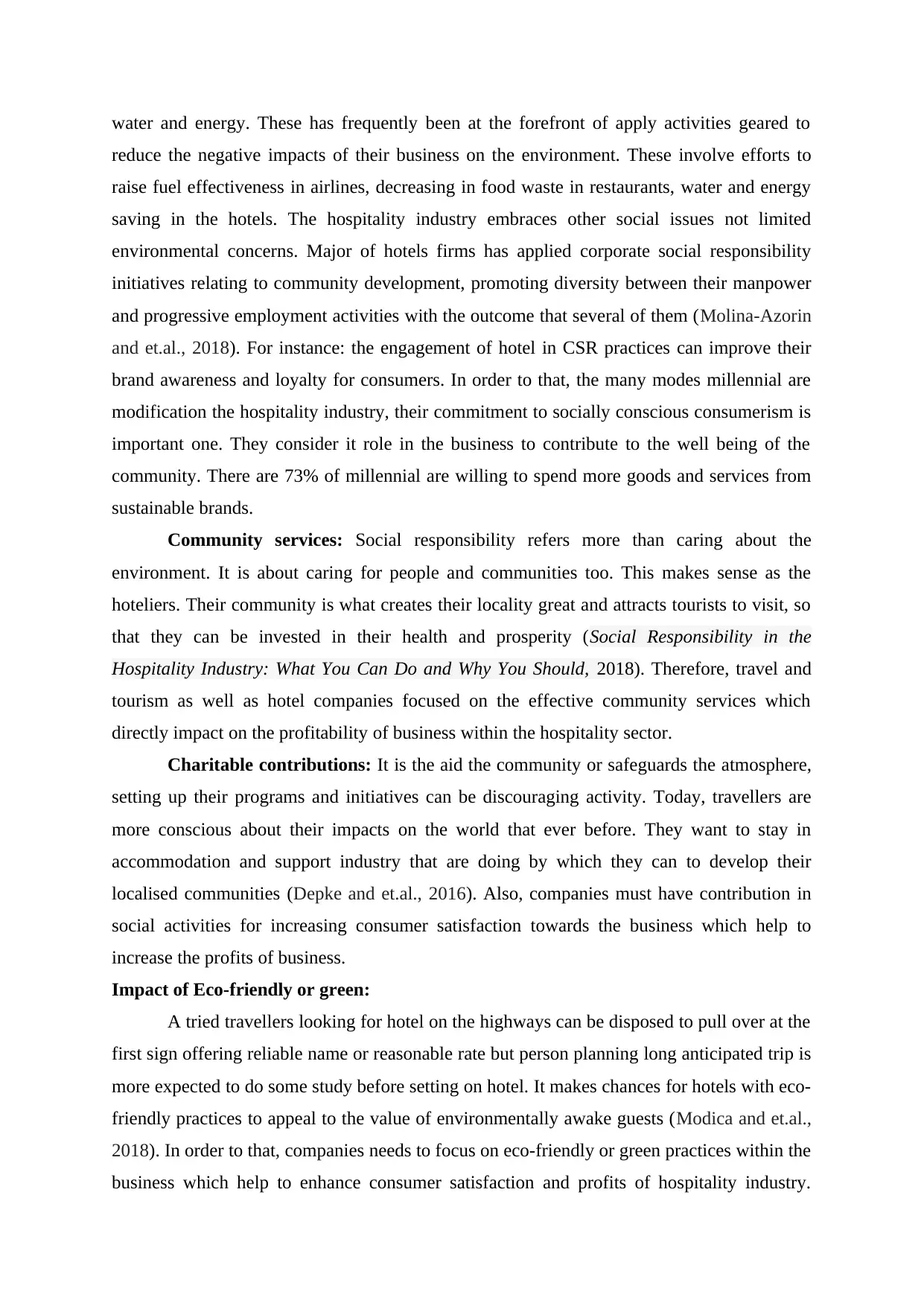
water and energy. These has frequently been at the forefront of apply activities geared to
reduce the negative impacts of their business on the environment. These involve efforts to
raise fuel effectiveness in airlines, decreasing in food waste in restaurants, water and energy
saving in the hotels. The hospitality industry embraces other social issues not limited
environmental concerns. Major of hotels firms has applied corporate social responsibility
initiatives relating to community development, promoting diversity between their manpower
and progressive employment activities with the outcome that several of them (Molina-Azorin
and et.al., 2018). For instance: the engagement of hotel in CSR practices can improve their
brand awareness and loyalty for consumers. In order to that, the many modes millennial are
modification the hospitality industry, their commitment to socially conscious consumerism is
important one. They consider it role in the business to contribute to the well being of the
community. There are 73% of millennial are willing to spend more goods and services from
sustainable brands.
Community services: Social responsibility refers more than caring about the
environment. It is about caring for people and communities too. This makes sense as the
hoteliers. Their community is what creates their locality great and attracts tourists to visit, so
that they can be invested in their health and prosperity (Social Responsibility in the
Hospitality Industry: What You Can Do and Why You Should, 2018). Therefore, travel and
tourism as well as hotel companies focused on the effective community services which
directly impact on the profitability of business within the hospitality sector.
Charitable contributions: It is the aid the community or safeguards the atmosphere,
setting up their programs and initiatives can be discouraging activity. Today, travellers are
more conscious about their impacts on the world that ever before. They want to stay in
accommodation and support industry that are doing by which they can to develop their
localised communities (Depke and et.al., 2016). Also, companies must have contribution in
social activities for increasing consumer satisfaction towards the business which help to
increase the profits of business.
Impact of Eco-friendly or green:
A tried travellers looking for hotel on the highways can be disposed to pull over at the
first sign offering reliable name or reasonable rate but person planning long anticipated trip is
more expected to do some study before setting on hotel. It makes chances for hotels with eco-
friendly practices to appeal to the value of environmentally awake guests (Modica and et.al.,
2018). In order to that, companies needs to focus on eco-friendly or green practices within the
business which help to enhance consumer satisfaction and profits of hospitality industry.
reduce the negative impacts of their business on the environment. These involve efforts to
raise fuel effectiveness in airlines, decreasing in food waste in restaurants, water and energy
saving in the hotels. The hospitality industry embraces other social issues not limited
environmental concerns. Major of hotels firms has applied corporate social responsibility
initiatives relating to community development, promoting diversity between their manpower
and progressive employment activities with the outcome that several of them (Molina-Azorin
and et.al., 2018). For instance: the engagement of hotel in CSR practices can improve their
brand awareness and loyalty for consumers. In order to that, the many modes millennial are
modification the hospitality industry, their commitment to socially conscious consumerism is
important one. They consider it role in the business to contribute to the well being of the
community. There are 73% of millennial are willing to spend more goods and services from
sustainable brands.
Community services: Social responsibility refers more than caring about the
environment. It is about caring for people and communities too. This makes sense as the
hoteliers. Their community is what creates their locality great and attracts tourists to visit, so
that they can be invested in their health and prosperity (Social Responsibility in the
Hospitality Industry: What You Can Do and Why You Should, 2018). Therefore, travel and
tourism as well as hotel companies focused on the effective community services which
directly impact on the profitability of business within the hospitality sector.
Charitable contributions: It is the aid the community or safeguards the atmosphere,
setting up their programs and initiatives can be discouraging activity. Today, travellers are
more conscious about their impacts on the world that ever before. They want to stay in
accommodation and support industry that are doing by which they can to develop their
localised communities (Depke and et.al., 2016). Also, companies must have contribution in
social activities for increasing consumer satisfaction towards the business which help to
increase the profits of business.
Impact of Eco-friendly or green:
A tried travellers looking for hotel on the highways can be disposed to pull over at the
first sign offering reliable name or reasonable rate but person planning long anticipated trip is
more expected to do some study before setting on hotel. It makes chances for hotels with eco-
friendly practices to appeal to the value of environmentally awake guests (Modica and et.al.,
2018). In order to that, companies needs to focus on eco-friendly or green practices within the
business which help to enhance consumer satisfaction and profits of hospitality industry.
⊘ This is a preview!⊘
Do you want full access?
Subscribe today to unlock all pages.

Trusted by 1+ million students worldwide
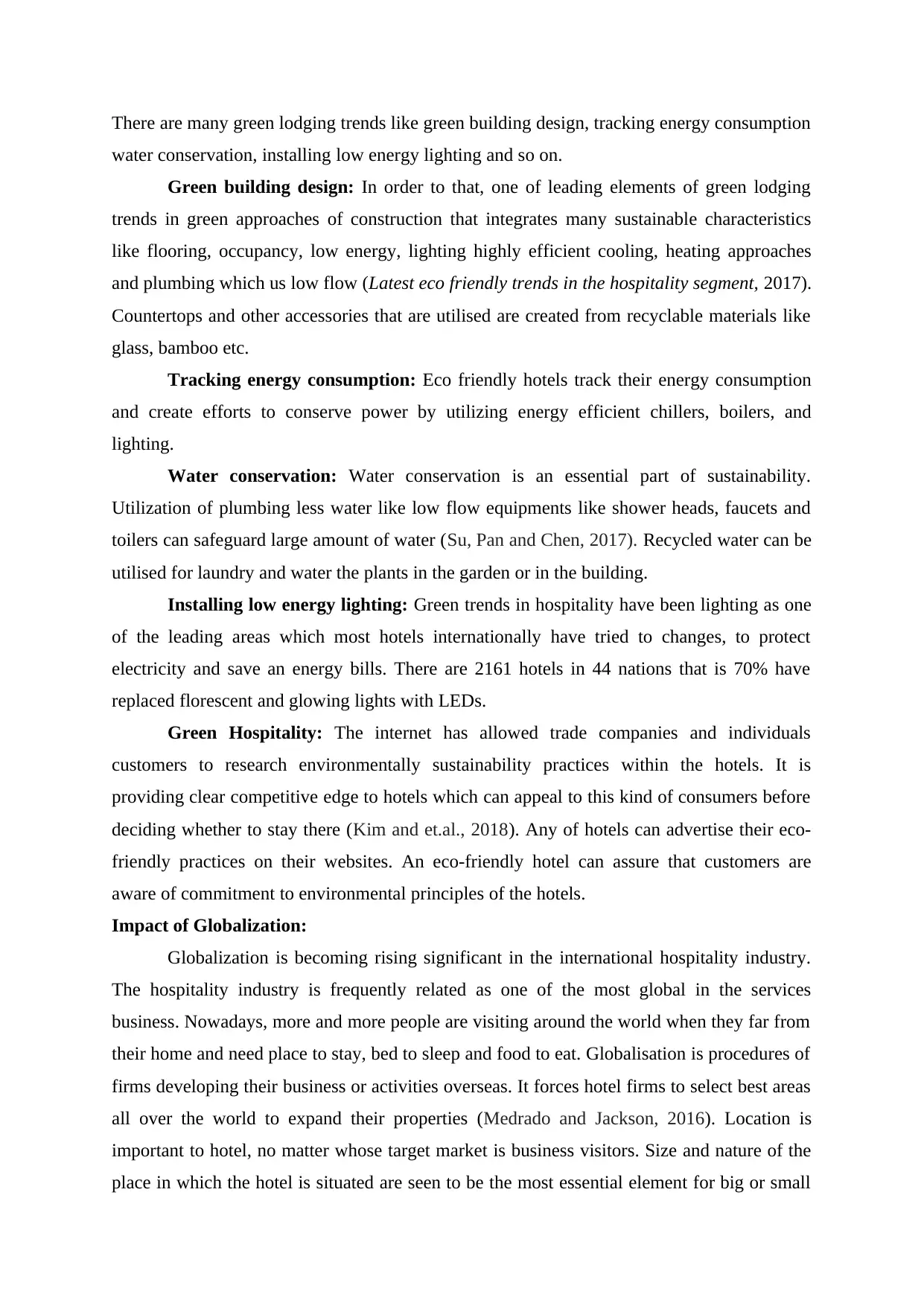
There are many green lodging trends like green building design, tracking energy consumption
water conservation, installing low energy lighting and so on.
Green building design: In order to that, one of leading elements of green lodging
trends in green approaches of construction that integrates many sustainable characteristics
like flooring, occupancy, low energy, lighting highly efficient cooling, heating approaches
and plumbing which us low flow (Latest eco friendly trends in the hospitality segment, 2017).
Countertops and other accessories that are utilised are created from recyclable materials like
glass, bamboo etc.
Tracking energy consumption: Eco friendly hotels track their energy consumption
and create efforts to conserve power by utilizing energy efficient chillers, boilers, and
lighting.
Water conservation: Water conservation is an essential part of sustainability.
Utilization of plumbing less water like low flow equipments like shower heads, faucets and
toilers can safeguard large amount of water (Su, Pan and Chen, 2017). Recycled water can be
utilised for laundry and water the plants in the garden or in the building.
Installing low energy lighting: Green trends in hospitality have been lighting as one
of the leading areas which most hotels internationally have tried to changes, to protect
electricity and save an energy bills. There are 2161 hotels in 44 nations that is 70% have
replaced florescent and glowing lights with LEDs.
Green Hospitality: The internet has allowed trade companies and individuals
customers to research environmentally sustainability practices within the hotels. It is
providing clear competitive edge to hotels which can appeal to this kind of consumers before
deciding whether to stay there (Kim and et.al., 2018). Any of hotels can advertise their eco-
friendly practices on their websites. An eco-friendly hotel can assure that customers are
aware of commitment to environmental principles of the hotels.
Impact of Globalization:
Globalization is becoming rising significant in the international hospitality industry.
The hospitality industry is frequently related as one of the most global in the services
business. Nowadays, more and more people are visiting around the world when they far from
their home and need place to stay, bed to sleep and food to eat. Globalisation is procedures of
firms developing their business or activities overseas. It forces hotel firms to select best areas
all over the world to expand their properties (Medrado and Jackson, 2016). Location is
important to hotel, no matter whose target market is business visitors. Size and nature of the
place in which the hotel is situated are seen to be the most essential element for big or small
water conservation, installing low energy lighting and so on.
Green building design: In order to that, one of leading elements of green lodging
trends in green approaches of construction that integrates many sustainable characteristics
like flooring, occupancy, low energy, lighting highly efficient cooling, heating approaches
and plumbing which us low flow (Latest eco friendly trends in the hospitality segment, 2017).
Countertops and other accessories that are utilised are created from recyclable materials like
glass, bamboo etc.
Tracking energy consumption: Eco friendly hotels track their energy consumption
and create efforts to conserve power by utilizing energy efficient chillers, boilers, and
lighting.
Water conservation: Water conservation is an essential part of sustainability.
Utilization of plumbing less water like low flow equipments like shower heads, faucets and
toilers can safeguard large amount of water (Su, Pan and Chen, 2017). Recycled water can be
utilised for laundry and water the plants in the garden or in the building.
Installing low energy lighting: Green trends in hospitality have been lighting as one
of the leading areas which most hotels internationally have tried to changes, to protect
electricity and save an energy bills. There are 2161 hotels in 44 nations that is 70% have
replaced florescent and glowing lights with LEDs.
Green Hospitality: The internet has allowed trade companies and individuals
customers to research environmentally sustainability practices within the hotels. It is
providing clear competitive edge to hotels which can appeal to this kind of consumers before
deciding whether to stay there (Kim and et.al., 2018). Any of hotels can advertise their eco-
friendly practices on their websites. An eco-friendly hotel can assure that customers are
aware of commitment to environmental principles of the hotels.
Impact of Globalization:
Globalization is becoming rising significant in the international hospitality industry.
The hospitality industry is frequently related as one of the most global in the services
business. Nowadays, more and more people are visiting around the world when they far from
their home and need place to stay, bed to sleep and food to eat. Globalisation is procedures of
firms developing their business or activities overseas. It forces hotel firms to select best areas
all over the world to expand their properties (Medrado and Jackson, 2016). Location is
important to hotel, no matter whose target market is business visitors. Size and nature of the
place in which the hotel is situated are seen to be the most essential element for big or small
Paraphrase This Document
Need a fresh take? Get an instant paraphrase of this document with our AI Paraphraser
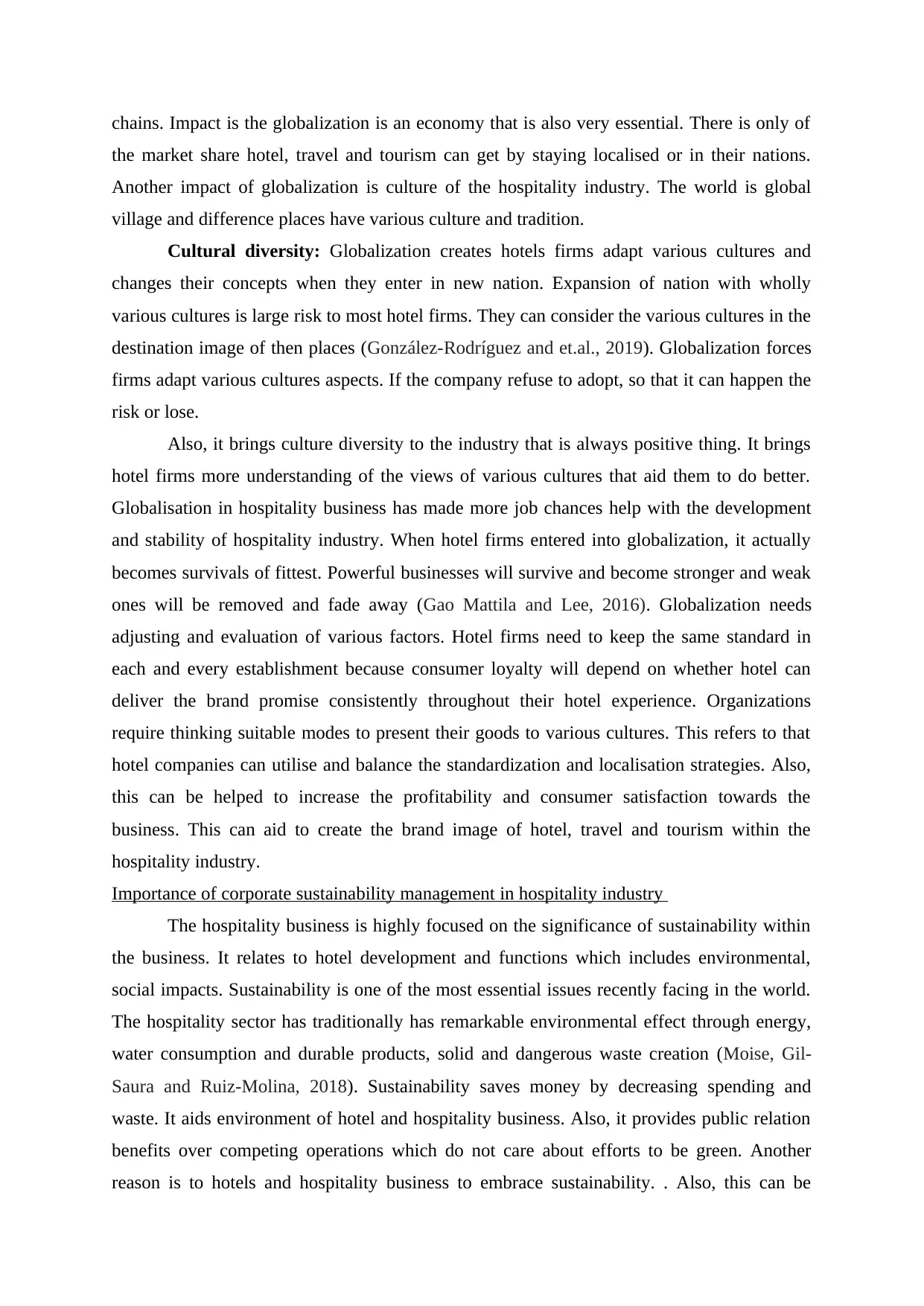
chains. Impact is the globalization is an economy that is also very essential. There is only of
the market share hotel, travel and tourism can get by staying localised or in their nations.
Another impact of globalization is culture of the hospitality industry. The world is global
village and difference places have various culture and tradition.
Cultural diversity: Globalization creates hotels firms adapt various cultures and
changes their concepts when they enter in new nation. Expansion of nation with wholly
various cultures is large risk to most hotel firms. They can consider the various cultures in the
destination image of then places (González-Rodríguez and et.al., 2019). Globalization forces
firms adapt various cultures aspects. If the company refuse to adopt, so that it can happen the
risk or lose.
Also, it brings culture diversity to the industry that is always positive thing. It brings
hotel firms more understanding of the views of various cultures that aid them to do better.
Globalisation in hospitality business has made more job chances help with the development
and stability of hospitality industry. When hotel firms entered into globalization, it actually
becomes survivals of fittest. Powerful businesses will survive and become stronger and weak
ones will be removed and fade away (Gao Mattila and Lee, 2016). Globalization needs
adjusting and evaluation of various factors. Hotel firms need to keep the same standard in
each and every establishment because consumer loyalty will depend on whether hotel can
deliver the brand promise consistently throughout their hotel experience. Organizations
require thinking suitable modes to present their goods to various cultures. This refers to that
hotel companies can utilise and balance the standardization and localisation strategies. Also,
this can be helped to increase the profitability and consumer satisfaction towards the
business. This can aid to create the brand image of hotel, travel and tourism within the
hospitality industry.
Importance of corporate sustainability management in hospitality industry
The hospitality business is highly focused on the significance of sustainability within
the business. It relates to hotel development and functions which includes environmental,
social impacts. Sustainability is one of the most essential issues recently facing in the world.
The hospitality sector has traditionally has remarkable environmental effect through energy,
water consumption and durable products, solid and dangerous waste creation (Moise, Gil-
Saura and Ruiz-Molina, 2018). Sustainability saves money by decreasing spending and
waste. It aids environment of hotel and hospitality business. Also, it provides public relation
benefits over competing operations which do not care about efforts to be green. Another
reason is to hotels and hospitality business to embrace sustainability. . Also, this can be
the market share hotel, travel and tourism can get by staying localised or in their nations.
Another impact of globalization is culture of the hospitality industry. The world is global
village and difference places have various culture and tradition.
Cultural diversity: Globalization creates hotels firms adapt various cultures and
changes their concepts when they enter in new nation. Expansion of nation with wholly
various cultures is large risk to most hotel firms. They can consider the various cultures in the
destination image of then places (González-Rodríguez and et.al., 2019). Globalization forces
firms adapt various cultures aspects. If the company refuse to adopt, so that it can happen the
risk or lose.
Also, it brings culture diversity to the industry that is always positive thing. It brings
hotel firms more understanding of the views of various cultures that aid them to do better.
Globalisation in hospitality business has made more job chances help with the development
and stability of hospitality industry. When hotel firms entered into globalization, it actually
becomes survivals of fittest. Powerful businesses will survive and become stronger and weak
ones will be removed and fade away (Gao Mattila and Lee, 2016). Globalization needs
adjusting and evaluation of various factors. Hotel firms need to keep the same standard in
each and every establishment because consumer loyalty will depend on whether hotel can
deliver the brand promise consistently throughout their hotel experience. Organizations
require thinking suitable modes to present their goods to various cultures. This refers to that
hotel companies can utilise and balance the standardization and localisation strategies. Also,
this can be helped to increase the profitability and consumer satisfaction towards the
business. This can aid to create the brand image of hotel, travel and tourism within the
hospitality industry.
Importance of corporate sustainability management in hospitality industry
The hospitality business is highly focused on the significance of sustainability within
the business. It relates to hotel development and functions which includes environmental,
social impacts. Sustainability is one of the most essential issues recently facing in the world.
The hospitality sector has traditionally has remarkable environmental effect through energy,
water consumption and durable products, solid and dangerous waste creation (Moise, Gil-
Saura and Ruiz-Molina, 2018). Sustainability saves money by decreasing spending and
waste. It aids environment of hotel and hospitality business. Also, it provides public relation
benefits over competing operations which do not care about efforts to be green. Another
reason is to hotels and hospitality business to embrace sustainability. . Also, this can be
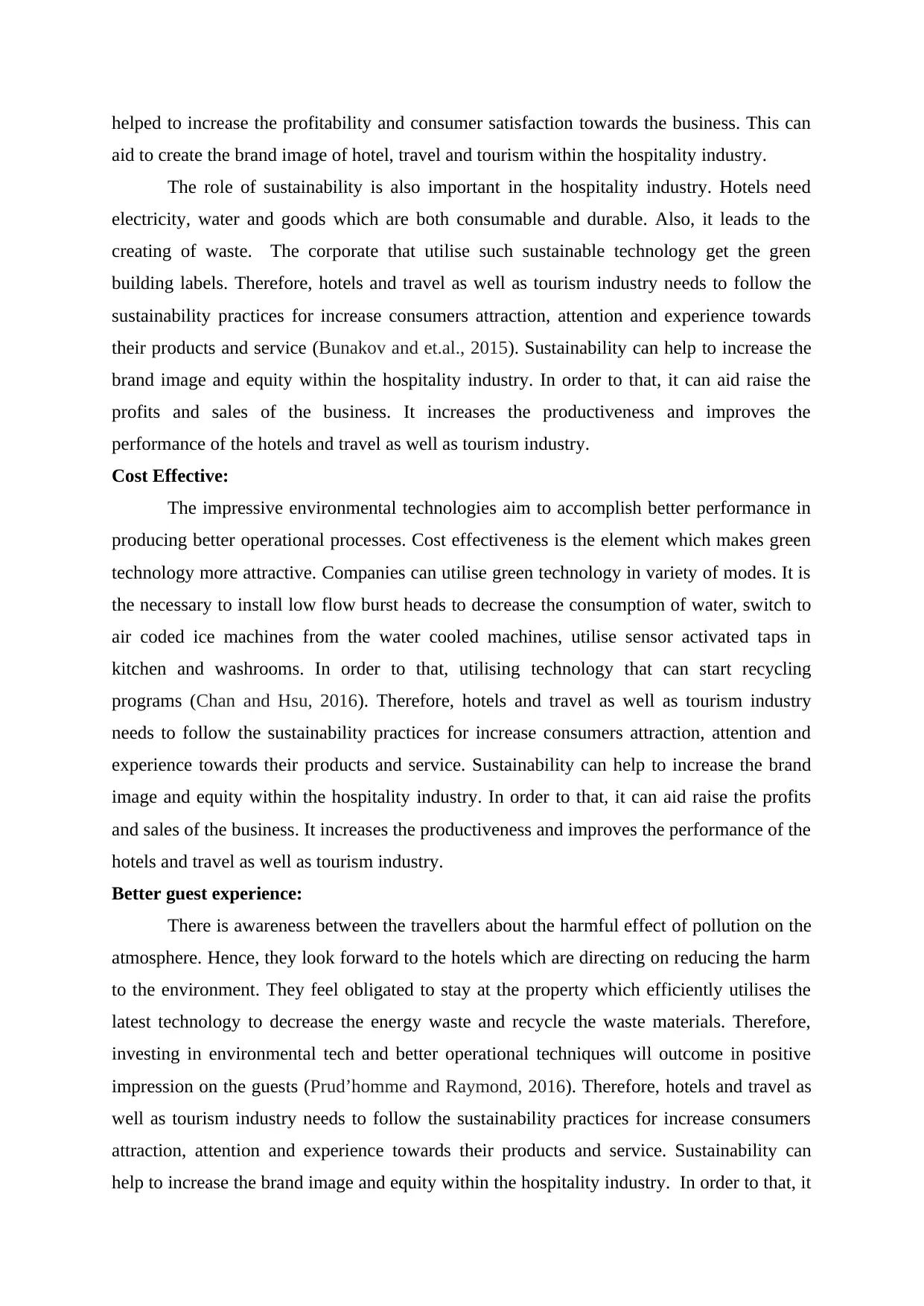
helped to increase the profitability and consumer satisfaction towards the business. This can
aid to create the brand image of hotel, travel and tourism within the hospitality industry.
The role of sustainability is also important in the hospitality industry. Hotels need
electricity, water and goods which are both consumable and durable. Also, it leads to the
creating of waste. The corporate that utilise such sustainable technology get the green
building labels. Therefore, hotels and travel as well as tourism industry needs to follow the
sustainability practices for increase consumers attraction, attention and experience towards
their products and service (Bunakov and et.al., 2015). Sustainability can help to increase the
brand image and equity within the hospitality industry. In order to that, it can aid raise the
profits and sales of the business. It increases the productiveness and improves the
performance of the hotels and travel as well as tourism industry.
Cost Effective:
The impressive environmental technologies aim to accomplish better performance in
producing better operational processes. Cost effectiveness is the element which makes green
technology more attractive. Companies can utilise green technology in variety of modes. It is
the necessary to install low flow burst heads to decrease the consumption of water, switch to
air coded ice machines from the water cooled machines, utilise sensor activated taps in
kitchen and washrooms. In order to that, utilising technology that can start recycling
programs (Chan and Hsu, 2016). Therefore, hotels and travel as well as tourism industry
needs to follow the sustainability practices for increase consumers attraction, attention and
experience towards their products and service. Sustainability can help to increase the brand
image and equity within the hospitality industry. In order to that, it can aid raise the profits
and sales of the business. It increases the productiveness and improves the performance of the
hotels and travel as well as tourism industry.
Better guest experience:
There is awareness between the travellers about the harmful effect of pollution on the
atmosphere. Hence, they look forward to the hotels which are directing on reducing the harm
to the environment. They feel obligated to stay at the property which efficiently utilises the
latest technology to decrease the energy waste and recycle the waste materials. Therefore,
investing in environmental tech and better operational techniques will outcome in positive
impression on the guests (Prud’homme and Raymond, 2016). Therefore, hotels and travel as
well as tourism industry needs to follow the sustainability practices for increase consumers
attraction, attention and experience towards their products and service. Sustainability can
help to increase the brand image and equity within the hospitality industry. In order to that, it
aid to create the brand image of hotel, travel and tourism within the hospitality industry.
The role of sustainability is also important in the hospitality industry. Hotels need
electricity, water and goods which are both consumable and durable. Also, it leads to the
creating of waste. The corporate that utilise such sustainable technology get the green
building labels. Therefore, hotels and travel as well as tourism industry needs to follow the
sustainability practices for increase consumers attraction, attention and experience towards
their products and service (Bunakov and et.al., 2015). Sustainability can help to increase the
brand image and equity within the hospitality industry. In order to that, it can aid raise the
profits and sales of the business. It increases the productiveness and improves the
performance of the hotels and travel as well as tourism industry.
Cost Effective:
The impressive environmental technologies aim to accomplish better performance in
producing better operational processes. Cost effectiveness is the element which makes green
technology more attractive. Companies can utilise green technology in variety of modes. It is
the necessary to install low flow burst heads to decrease the consumption of water, switch to
air coded ice machines from the water cooled machines, utilise sensor activated taps in
kitchen and washrooms. In order to that, utilising technology that can start recycling
programs (Chan and Hsu, 2016). Therefore, hotels and travel as well as tourism industry
needs to follow the sustainability practices for increase consumers attraction, attention and
experience towards their products and service. Sustainability can help to increase the brand
image and equity within the hospitality industry. In order to that, it can aid raise the profits
and sales of the business. It increases the productiveness and improves the performance of the
hotels and travel as well as tourism industry.
Better guest experience:
There is awareness between the travellers about the harmful effect of pollution on the
atmosphere. Hence, they look forward to the hotels which are directing on reducing the harm
to the environment. They feel obligated to stay at the property which efficiently utilises the
latest technology to decrease the energy waste and recycle the waste materials. Therefore,
investing in environmental tech and better operational techniques will outcome in positive
impression on the guests (Prud’homme and Raymond, 2016). Therefore, hotels and travel as
well as tourism industry needs to follow the sustainability practices for increase consumers
attraction, attention and experience towards their products and service. Sustainability can
help to increase the brand image and equity within the hospitality industry. In order to that, it
⊘ This is a preview!⊘
Do you want full access?
Subscribe today to unlock all pages.

Trusted by 1+ million students worldwide
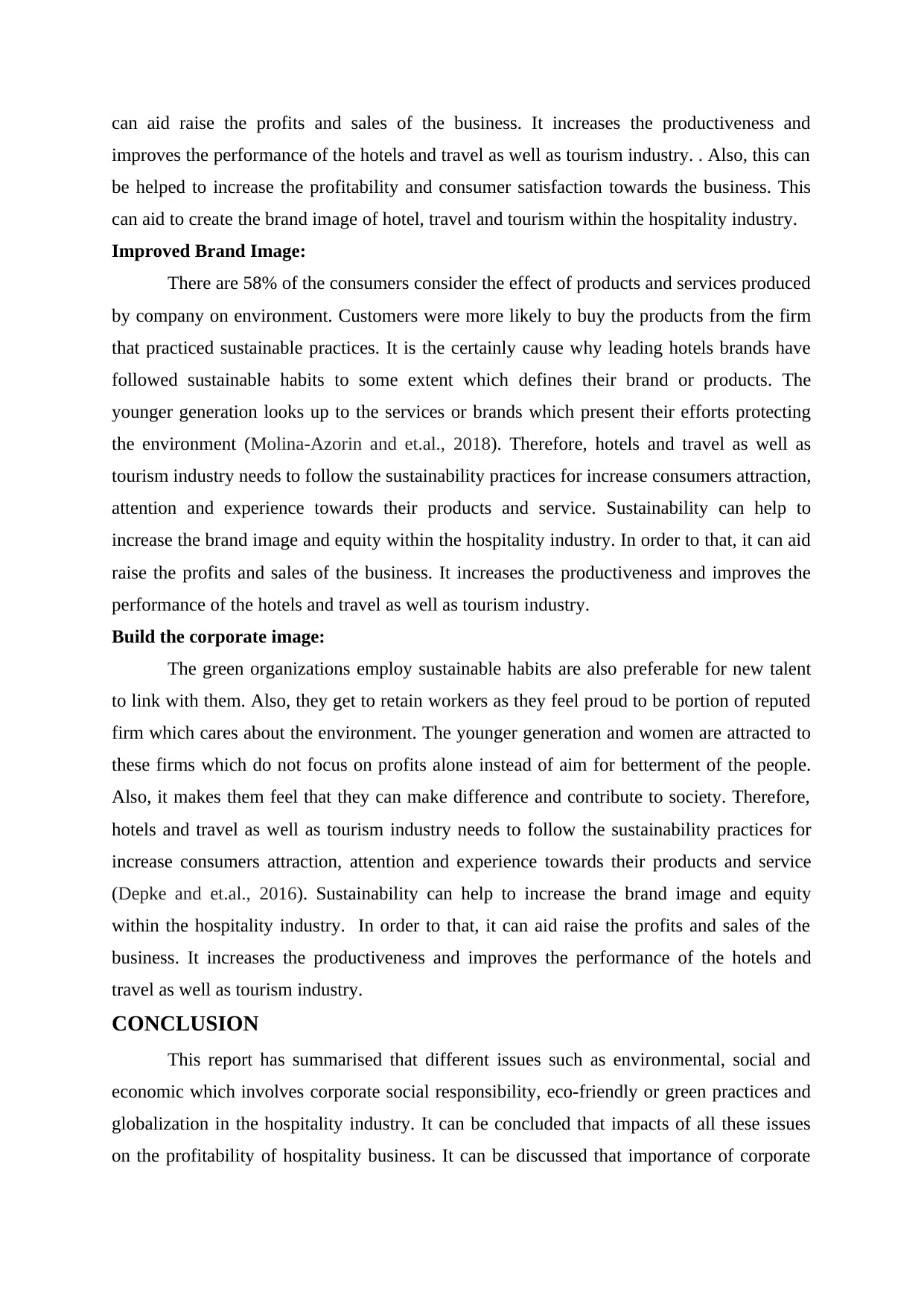
can aid raise the profits and sales of the business. It increases the productiveness and
improves the performance of the hotels and travel as well as tourism industry. . Also, this can
be helped to increase the profitability and consumer satisfaction towards the business. This
can aid to create the brand image of hotel, travel and tourism within the hospitality industry.
Improved Brand Image:
There are 58% of the consumers consider the effect of products and services produced
by company on environment. Customers were more likely to buy the products from the firm
that practiced sustainable practices. It is the certainly cause why leading hotels brands have
followed sustainable habits to some extent which defines their brand or products. The
younger generation looks up to the services or brands which present their efforts protecting
the environment (Molina-Azorin and et.al., 2018). Therefore, hotels and travel as well as
tourism industry needs to follow the sustainability practices for increase consumers attraction,
attention and experience towards their products and service. Sustainability can help to
increase the brand image and equity within the hospitality industry. In order to that, it can aid
raise the profits and sales of the business. It increases the productiveness and improves the
performance of the hotels and travel as well as tourism industry.
Build the corporate image:
The green organizations employ sustainable habits are also preferable for new talent
to link with them. Also, they get to retain workers as they feel proud to be portion of reputed
firm which cares about the environment. The younger generation and women are attracted to
these firms which do not focus on profits alone instead of aim for betterment of the people.
Also, it makes them feel that they can make difference and contribute to society. Therefore,
hotels and travel as well as tourism industry needs to follow the sustainability practices for
increase consumers attraction, attention and experience towards their products and service
(Depke and et.al., 2016). Sustainability can help to increase the brand image and equity
within the hospitality industry. In order to that, it can aid raise the profits and sales of the
business. It increases the productiveness and improves the performance of the hotels and
travel as well as tourism industry.
CONCLUSION
This report has summarised that different issues such as environmental, social and
economic which involves corporate social responsibility, eco-friendly or green practices and
globalization in the hospitality industry. It can be concluded that impacts of all these issues
on the profitability of hospitality business. It can be discussed that importance of corporate
improves the performance of the hotels and travel as well as tourism industry. . Also, this can
be helped to increase the profitability and consumer satisfaction towards the business. This
can aid to create the brand image of hotel, travel and tourism within the hospitality industry.
Improved Brand Image:
There are 58% of the consumers consider the effect of products and services produced
by company on environment. Customers were more likely to buy the products from the firm
that practiced sustainable practices. It is the certainly cause why leading hotels brands have
followed sustainable habits to some extent which defines their brand or products. The
younger generation looks up to the services or brands which present their efforts protecting
the environment (Molina-Azorin and et.al., 2018). Therefore, hotels and travel as well as
tourism industry needs to follow the sustainability practices for increase consumers attraction,
attention and experience towards their products and service. Sustainability can help to
increase the brand image and equity within the hospitality industry. In order to that, it can aid
raise the profits and sales of the business. It increases the productiveness and improves the
performance of the hotels and travel as well as tourism industry.
Build the corporate image:
The green organizations employ sustainable habits are also preferable for new talent
to link with them. Also, they get to retain workers as they feel proud to be portion of reputed
firm which cares about the environment. The younger generation and women are attracted to
these firms which do not focus on profits alone instead of aim for betterment of the people.
Also, it makes them feel that they can make difference and contribute to society. Therefore,
hotels and travel as well as tourism industry needs to follow the sustainability practices for
increase consumers attraction, attention and experience towards their products and service
(Depke and et.al., 2016). Sustainability can help to increase the brand image and equity
within the hospitality industry. In order to that, it can aid raise the profits and sales of the
business. It increases the productiveness and improves the performance of the hotels and
travel as well as tourism industry.
CONCLUSION
This report has summarised that different issues such as environmental, social and
economic which involves corporate social responsibility, eco-friendly or green practices and
globalization in the hospitality industry. It can be concluded that impacts of all these issues
on the profitability of hospitality business. It can be discussed that importance of corporate
Paraphrase This Document
Need a fresh take? Get an instant paraphrase of this document with our AI Paraphraser

sustainability management which includes build the corporate image, improved brand image
and cost effective in hospitality industry. Furthermore, report has completed that impact of
corporate social responsibility which involves community services and charitable
contribution by the hospitality industry. It can be evaluated that building green design, water
conservation by hotel industry. . Also, this can be helped to increase the profitability and
consumer satisfaction towards the business. This can aid to create the brand image of hotel,
travel and tourism within the hospitality industry.
and cost effective in hospitality industry. Furthermore, report has completed that impact of
corporate social responsibility which involves community services and charitable
contribution by the hospitality industry. It can be evaluated that building green design, water
conservation by hotel industry. . Also, this can be helped to increase the profitability and
consumer satisfaction towards the business. This can aid to create the brand image of hotel,
travel and tourism within the hospitality industry.
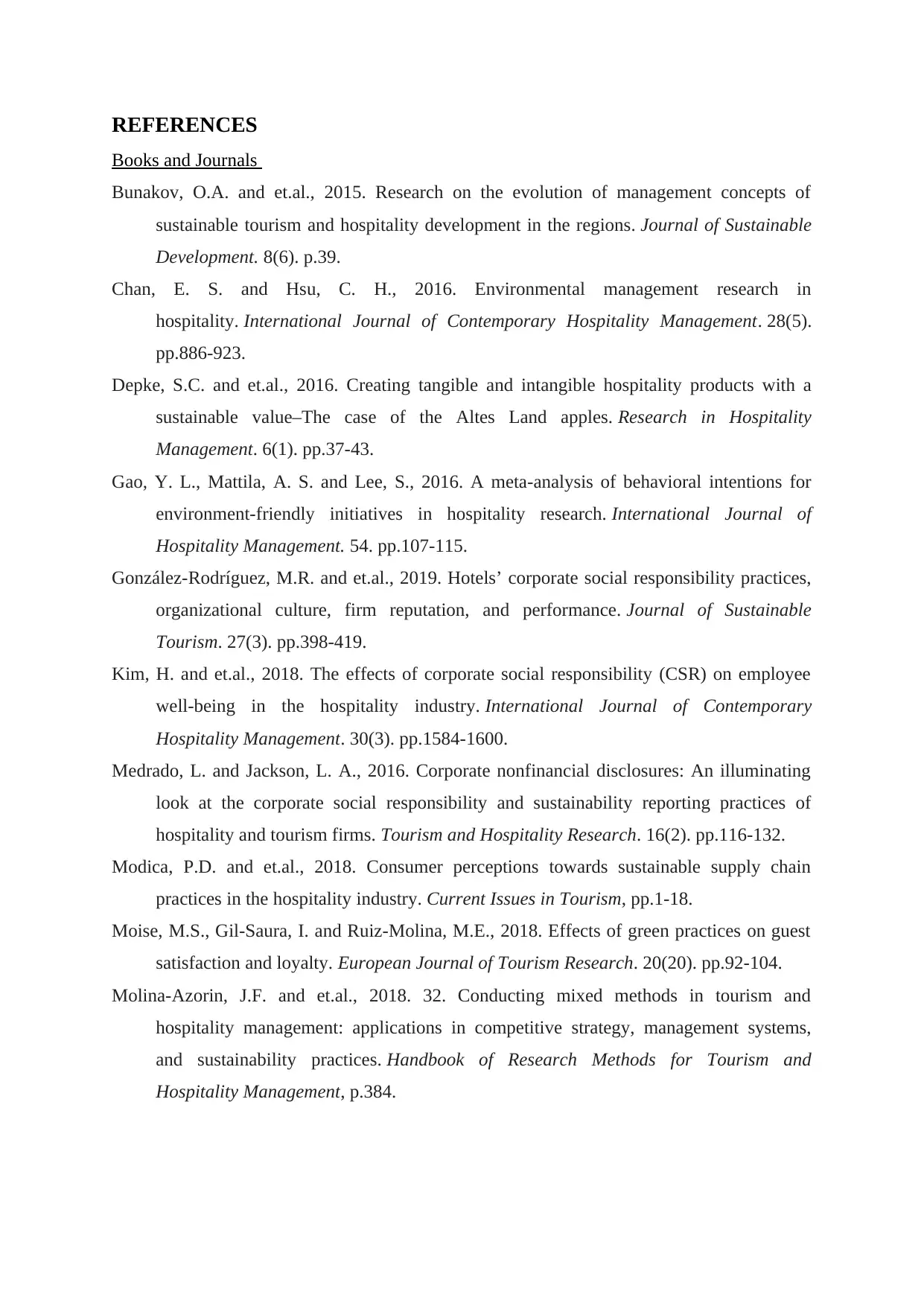
REFERENCES
Books and Journals
Bunakov, O.A. and et.al., 2015. Research on the evolution of management concepts of
sustainable tourism and hospitality development in the regions. Journal of Sustainable
Development. 8(6). p.39.
Chan, E. S. and Hsu, C. H., 2016. Environmental management research in
hospitality. International Journal of Contemporary Hospitality Management. 28(5).
pp.886-923.
Depke, S.C. and et.al., 2016. Creating tangible and intangible hospitality products with a
sustainable value–The case of the Altes Land apples. Research in Hospitality
Management. 6(1). pp.37-43.
Gao, Y. L., Mattila, A. S. and Lee, S., 2016. A meta-analysis of behavioral intentions for
environment-friendly initiatives in hospitality research. International Journal of
Hospitality Management. 54. pp.107-115.
González-Rodríguez, M.R. and et.al., 2019. Hotels’ corporate social responsibility practices,
organizational culture, firm reputation, and performance. Journal of Sustainable
Tourism. 27(3). pp.398-419.
Kim, H. and et.al., 2018. The effects of corporate social responsibility (CSR) on employee
well-being in the hospitality industry. International Journal of Contemporary
Hospitality Management. 30(3). pp.1584-1600.
Medrado, L. and Jackson, L. A., 2016. Corporate nonfinancial disclosures: An illuminating
look at the corporate social responsibility and sustainability reporting practices of
hospitality and tourism firms. Tourism and Hospitality Research. 16(2). pp.116-132.
Modica, P.D. and et.al., 2018. Consumer perceptions towards sustainable supply chain
practices in the hospitality industry. Current Issues in Tourism, pp.1-18.
Moise, М.S., Gil-Saura, I. and Ruiz-Molina, M.E., 2018. Effects of green practices on guest
satisfaction and loyalty. European Journal of Tourism Research. 20(20). pp.92-104.
Molina-Azorin, J.F. and et.al., 2018. 32. Conducting mixed methods in tourism and
hospitality management: applications in competitive strategy, management systems,
and sustainability practices. Handbook of Research Methods for Tourism and
Hospitality Management, p.384.
Books and Journals
Bunakov, O.A. and et.al., 2015. Research on the evolution of management concepts of
sustainable tourism and hospitality development in the regions. Journal of Sustainable
Development. 8(6). p.39.
Chan, E. S. and Hsu, C. H., 2016. Environmental management research in
hospitality. International Journal of Contemporary Hospitality Management. 28(5).
pp.886-923.
Depke, S.C. and et.al., 2016. Creating tangible and intangible hospitality products with a
sustainable value–The case of the Altes Land apples. Research in Hospitality
Management. 6(1). pp.37-43.
Gao, Y. L., Mattila, A. S. and Lee, S., 2016. A meta-analysis of behavioral intentions for
environment-friendly initiatives in hospitality research. International Journal of
Hospitality Management. 54. pp.107-115.
González-Rodríguez, M.R. and et.al., 2019. Hotels’ corporate social responsibility practices,
organizational culture, firm reputation, and performance. Journal of Sustainable
Tourism. 27(3). pp.398-419.
Kim, H. and et.al., 2018. The effects of corporate social responsibility (CSR) on employee
well-being in the hospitality industry. International Journal of Contemporary
Hospitality Management. 30(3). pp.1584-1600.
Medrado, L. and Jackson, L. A., 2016. Corporate nonfinancial disclosures: An illuminating
look at the corporate social responsibility and sustainability reporting practices of
hospitality and tourism firms. Tourism and Hospitality Research. 16(2). pp.116-132.
Modica, P.D. and et.al., 2018. Consumer perceptions towards sustainable supply chain
practices in the hospitality industry. Current Issues in Tourism, pp.1-18.
Moise, М.S., Gil-Saura, I. and Ruiz-Molina, M.E., 2018. Effects of green practices on guest
satisfaction and loyalty. European Journal of Tourism Research. 20(20). pp.92-104.
Molina-Azorin, J.F. and et.al., 2018. 32. Conducting mixed methods in tourism and
hospitality management: applications in competitive strategy, management systems,
and sustainability practices. Handbook of Research Methods for Tourism and
Hospitality Management, p.384.
⊘ This is a preview!⊘
Do you want full access?
Subscribe today to unlock all pages.

Trusted by 1+ million students worldwide
1 out of 13
Related Documents
Your All-in-One AI-Powered Toolkit for Academic Success.
+13062052269
info@desklib.com
Available 24*7 on WhatsApp / Email
![[object Object]](/_next/static/media/star-bottom.7253800d.svg)
Unlock your academic potential
Copyright © 2020–2025 A2Z Services. All Rights Reserved. Developed and managed by ZUCOL.




